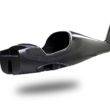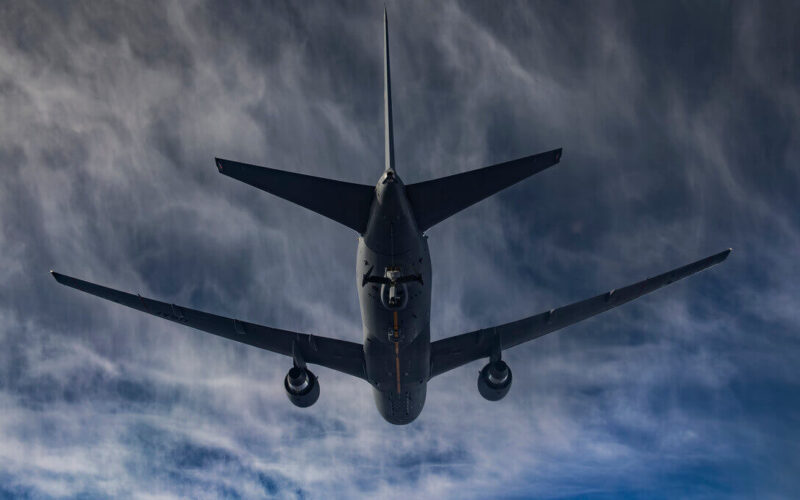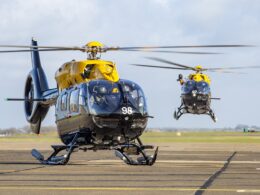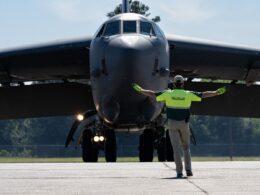The State Department officially informed the Congress of its intention to proceed with the sale of 8 Boeing KC-46A Pegasus tankers, the Defense Security Cooperation Agency (DSCA) announced. The sale could help reduce the stress currently affecting the USAF aerial refueling capacities.
Additionally to the aircraft, which will replace the 9 KC-707s of the Israeli Air Force, the contract would include up to 17 PW4062 turbofan engines (16 installed, 1 spare), as well as a number of spare components, training, and support equipment and services. The total cost is estimated at $2.4 billion. If the sale is confirmed, Israel would become the second export customer of the KC-46A after Japan, which has ordered two aircraft.
“The proposed sale further supports the foreign policy and national security of the United States by allowing Israel to provide a redundant capability to U.S. assets within the region, potentially freeing U.S. assets for use elsewhere during times of war,” says the Defense Security Cooperation Agency. “Aerial refueling and strategic airlift are consistently cited as significant shortfalls for our allies.”
Filling the capacity gap
Giving more autonomy to Israel follows the new U.S. defense strategy defined in January 2018. As it is, the U.S. Air Force is struggling with its aerial refueling capacities, both for its own needs and those of its allies. Speaking at the Atlantic Council in January 2020, General Stephen R. Lyons, commander of U.S. Transportation Command, said the U.S. military was “exceeding the red line“. The capacity gap jeopardizes the projection capacity needed to answer to Chinese and Russian ambition.
Consequently, the Pentagon is reviewing the involvement of the U.S. military abroad and could disengage from certain deployments, such as the refueling and transport support it provides to France, which is currently engaged in Operation Barkhane against Islamist insurgents in Mali.
To make matters worse, the KC-46 Pegasus, supposed to replace the KC-135 Stratotanker and KC-10 Extender and reinforce the refueling capacities, has encountered numerous technical problems since its delivery. At a Congressional hearing on March 3, 2020, General David Goldfein, Chief of Staff of the U.S. Air Force, said he would only send the KC-46A in a contested environment “with highly trained crews if absolutely necessary,” as phrased by Air Force Mag. “We won’t use it for day-to-day operations, but it will be made available for a contingency,” Goldfein said.
Upon delivery of the first aircraft on January 10, 2019, more than a year after the due date, it came to light that the “Remote Vision System” (RVS), developed by Rockwell Collins, does not work as intended, especially under certain light conditions. The RVS is composed of several sensors and cameras that should help a boom operator during aerial refueling. But the USAF has discovered discrepancies between the motion shown by the RVS and what was happening in real life. Boeing has agreed to fix the RVS at its expense, a process that could take three to four years.
Another problem was the design of the boom itself. During aerial refueling, both the tanker and the receiving aircraft must work together to connect the nozzle of the boom to the “receptacle” of the aircraft. However, multiple aircraft within the USAF, including the A-10 ground attack aircraft, were found unable to generate sufficient thrust to connect. Boeing was awarded $55.5 million by the USAF to fix it.
Throughout 2019, deliveries were also suspended twice due to quality concerns. Loose tools and foreign object debris (FOD) were found in the tankers received by the USAF, including in the closed compartments of their wings. The planes had been assembled at Boeing Everett Factory, the company’s biggest production plant.
In September 2019, an incident revealed that the fasteners on the floor of the cargo hold may unlock during flight. As loose cargo could potentially injure or kill people on board and also affect the center of gravity of the aircraft enough to make its operation dangerous and cause an accident, a Flight Crew Information File was issued by the Air Mobility Command (AMC), and the aircraft manufactured by Boeing was prohibited from transporting any cargo. Will Roper, Assistant Secretary of the Air Force for Acquisition, Technology and Logistics, told the solution could still take months.
To address the capacity gap that the KC-46 Pegasus has yet to fill, multiple voices have suggested the use of private contractors. The latest was Lyons, who told the Atlantic Council that the idea of leasing aerial refueling services could be a way to reduce the stress. However, the commander had “yet to see the business case”.
In December 2018, Lockheed Martin and Airbus signed a memorandum of agreement to jointly explore opportunities to meet the growing demand for aerial refueling for US defense customers, most likely by relying on the Airbus A330 MRTT. Contacted by AeroTime, both manufacturers said the prospect was still being studied. “We continue to work together to define a path to support the U.S. Air Force and their tanker mission and look forward to reviewing an RFP when released,” they said.










